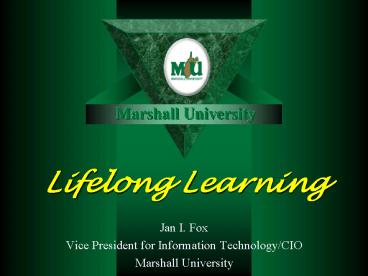Lifelong Learning - PowerPoint PPT Presentation
1 / 31
Title: Lifelong Learning
1
Lifelong Learning
- Jan I. Fox
- Vice President for Information Technology/CIO
- Marshall University
2
QUALITY JOBS
Education Work
3
LARGE FORCES ARE CHANGING JOBS IN WEST VIRGINIA
NEW TECHNOLOGIES
GLOBAL COMPETITION
OurWork
4
HIGHER INCOMES LINK TO EDUCATION
5
BETTER LIVES FORWEST VIRGINIANS
6
OPPORTUNITIES AND COMMUNITIES
7
NEW OPPORTUNITIES THROUGHOUT WEST VIRGINIA
8
EDUCATION PRODUCES NEW OPPORTUNITIES
9
STRONG FAMILIES MORE TIME WITH CHILDREN
10
ALL FAMILIES WILL NEED SUPPORT AT SOME TIME
11
COMMUNITIES SUPPORTING FAMILIES
12
The Knowledge Explosion Growth of Scientific
Knowledge to the Year 2000
100 80 60 40 20 0
8000 1800 1900 1950 2000 2020 B.C.
A.D. est.
Fortune Chart/Source Bruce Merrifield, Wharton
School
13
John Deaver Drinko LibraryMarshall University
14
John Deaver Drinko LibraryMarshall University
15
John Deaver Drinko Library
- 117,000 square feet
- Space for 200,000 printed volumes
- Electronic Subscriptions
- 100s of computerized student workstations
- 24-hour computer lab/study area
- Individual study areas and rooms
- Team collaborative rooms with computers and
teleconferencing capabilities - Multi-media training/presentation rooms
- Starbucks café
16
John Deaver Drinko Library
- Open stacks
- Technical services
- Reference services
- Circulation services
- Periodicals microfilm
- Reference collection
- Meeting Areas
- Assistive Technology
- DVD Desktop Video
- Wireless Patron Pads
- Digital Scanning
- Color Poster Printing
- Two-way video
- Teleconference capabilities
- Digital Content Creation and Storage
17
(No Transcript)
18
(No Transcript)
19
(No Transcript)
20
(No Transcript)
21
Digital Revolutionis here
Computing
Consumer Electronics Digital TV
Mass Media
D
a
i
l
y
N
e
w
s
Publishing
Telecommunications
22
Workforce Skill-Needsvs. Academic Preparation
I
n
d
u
s
t
r
y
S
k
i
l
l
-
N
e
e
d
s
I
n
d
u
s
t
r
y
S
k
i
l
l
-
N
e
e
d
s
T
e
c
h
n
o
l
o
g
i
c
a
l
S
k
i
l
l
s
G
a
p
G
r
a
d
u
a
t
e
'
s
S
k
i
l
l
s
G
r
a
d
u
a
t
e
'
s
S
k
i
l
l
s
1970
2000
23
(No Transcript)
24
One Room School - 2000
25
What Is The One Room School 2000 Project
- The One Room School2000 project integrates
existing education network infrastructures into a
cost effective, scalable and expandable network
that enhances existing network strategies while
integrating the new Asynchronous Transfer Mode
(ATM) network architecture. This will allow for
the integration of multimedia technologies with
current and emerging communications technologies
for use in distance education.
26
(No Transcript)
27
Benefits to Students
- The Electronic Campus increases students options
dramatically. Courses not previously available
where a student lives or at a time that was
convenient may in fact now be available. Students
in the most remote areas will have access to
courses and programs that have not been readily
available. - Students will have the confidence of knowing
that the courses offered via the Electronic
Campus are pledged to follow the Principles of
Good Practice. - Students will be able to compare courses,
methods of instruction, how courses are delivered
and costs. - The Electronic Campus will provide a central
point of information and an "orderly electronic
marketplace amidst the chaos of a booming
Internet."
28
Benefits to States
- The Electronic Campus will provide the
opportunity for more education for more citizens.
The Electronic campus will increase access for
students to needed information on educational
courses and programs. - The Electronic Campus could allow states,
through cooperative development, to jointly share
in creating needed courses and programs - the
"electronic wheel" will not have to be reinvented
each time. - Areas previously isolated from the best of
educational opportunities will no longer be cut
off because of geography. - Quality educational programs available in any
SREB state can be just as accessible to the
students in all SREB states. - The Electronic Campus will provide increased
economic development opportunities for all SREB
states. Southern Regional Education Board states
involved are Alabama, Arkansas, Florida,
Georgia, Kentucky, Louisiana, Maryland,
Mississippi, North Carolina, Oklahoma, South
Carolina, Tennessee, Texas, Virginia and West
Virginia.
29
(No Transcript)
30
(No Transcript)
31
Online Computer Based Training (CBT)































